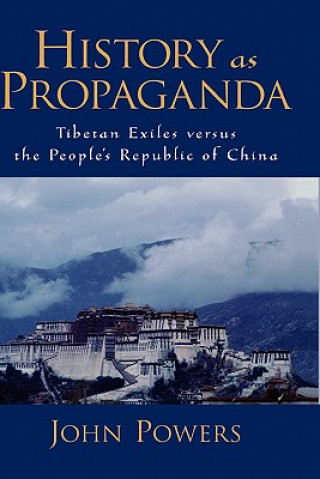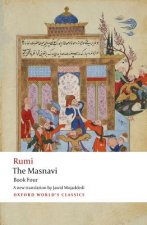
Kód: 04516366
History As Propaganda
Autor John Powers
Despite Chinese efforts to stop foreign countries from granting him visas, the Dalai Lama has become one of the most recognizable and best loved people on the planet, drawing enormous crowds wherever he goes. By contrast, China's ... celý popis
- Jazyk:
 Angličtina
Angličtina - Väzba: Pevná
- Počet strán: 224
Nakladateľ: Oxford University Press Inc, 2004
- Viac informácií o knihe

Mohlo by sa vám tiež páčiť
-

State Space Approach to Canonical Factorization with Applications
147.71 € -

Propaganda, Power and Persuasion
28.11 € -4 % -

Un Generatore Di Schemi Sudoku in Java
10.35 € -1 %
Darčekový poukaz: Radosť zaručená
- Darujte poukaz v ľubovoľnej hodnote, a my sa postaráme o zvyšok.
- Poukaz sa vzťahuje na všetky produkty v našej ponuke.
- Elektronický poukaz si vytlačíte z e-mailu a môžete ho ihneď darovať.
- Platnosť poukazu je 12 mesiacov od dátumu vystavenia.
Viac informácií o knihe History As Propaganda
Nákupom získate 210 bodov
 Anotácia knihy
Anotácia knihy
Despite Chinese efforts to stop foreign countries from granting him visas, the Dalai Lama has become one of the most recognizable and best loved people on the planet, drawing enormous crowds wherever he goes. By contrast, China's charismatically-challenged leaders attract crowds of protestors waving Tibetan flags and shouting "Free Tibet!" whenever they visit foreign countries. By now most Westerners probably think they understand the political situation in Tibet. But, John Powers argues, most Western scholars of Tibet evince a bias in favor of one side or the other in this continuing struggle. Some of the most emotionally charged rhetoric, says Powers, is found in studies of Tibetan history. History is viewed by both sides as crucial to their claims, and both invest a great deal of energy in producing works that purport to tell the "truth" about Tibet's past. Powers shows that the two sides' views are mutually incompatible and that both sides sincerely believe what they say. Both are operating within a particular psychological context in which certain assumptions guide their inquiry and predetermine their conclusions. Both are so thoroughly convinced of the utter rightness of their paradigms that they cannot even imagine that someone might sincerely hold the opposing view, and so they accuse their opponents of deliberately lying and covering up the "facts" and the "truth." Both reflect the vastly different cultural myths of the societies that produced them. Chinese sources begin with the notion that China is at the center of the world and is the only civilized society, with a mandate to rule over all other countries. Tibetan records are thoroughly infused with Buddhist imagery and presuppositions, and the underlying narrative is the diffusion and glorification of religion. Powers examines works on Tibetan history by Tibetan and Chinese authors that have been produced in English for Western consumption. He finds some of their claims absurd, others highly implausible, some humorous in an unintended way. Both narratives are fraught with internal contradictions and inconsistencies. And even the most ridiculous notions, Powers notes, are often reflected in works by contemporary Western academics. Powers's impartial examination of the competing narratives will help us to better understand the issues involved in debates about Tibetan history-why apparently arcane vestiges of the past are so important to both Tibetan and Chinese nationalist narratives.
 Parametre knihy
Parametre knihy
Zaradenie knihy Knihy po anglicky Humanities History Regional & national history
84.05 €
- Celý názov: History As Propaganda
- Podnázov: Tibetan Exiles versus the People's Republic of China
- Autor: John Powers
- Jazyk:
 Angličtina
Angličtina - Väzba: Pevná
- Počet strán: 224
- EAN: 9780195174267
- ISBN: 0195174267
- ID: 04516366
- Nakladateľ: Oxford University Press Inc
- Hmotnosť: 474 g
- Rozmery: 243 × 166 × 19 mm
- Dátum vydania: 28. October 2004
Obľúbené z iného súdka
-

Hundred Years' War on Palestine
12.07 € -24 % -

The Secret Diaries Of Miss Anne Lister: Vol. 1
13.59 € -14 % -

Secret History
11.36 € -28 % -

How to be a Victorian
13.39 € -28 % -

Hell's Cartel
19.79 € -18 % -

Concise History of Italy
29.23 € -5 % -

Complete Pompeii
31.06 € -23 % -

Alexander the Great
17.35 € -28 % -

Everything You Were Taught About the Civil War is Wrong, Ask a Southerner!
21.72 € -1 % -

1000 Years of Annoying the French
11.36 € -28 % -

Korean History in Maps
28.11 € -9 % -

Masnavi. Book Four
12.38 € -28 % -

Napoleon'S Buttons
19.69 € -11 % -

Rome
41.92 € -22 % -

Iran: Empire of the Mind
13.39 € -28 % -

Transforming Power Of Affect
66.69 € -

Cold War
14 € -27 % -

Great Nation: France from Louis XV to Napoleon
23.24 € -18 % -

Homage to Barcelona
11.77 € -18 % -

Shortest History of Europe
9.33 € -28 % -

Bannockburn 1314
21.82 € -9 % -

Africa
41.11 € -5 % -

Balkans in World History
36.13 € -

Death in the Air
15.83 € -25 % -

Battle Studies
30.75 € -

Women Who Shaped Politics
23.24 € -18 % -

Fall of the Roman Empire
17.35 € -28 % -

Ottoman Survey Register of Podolia (CA.1681) - Defter-i-Mufassal-i Eyalet-i Kamanice Part 1 - text,Translation and Commentary, Pt 2 - Fac 2VSet
90.65 € -

History of the Steel Helmet in the First World War: Vol 1: Austro-Hungary, Belgium, Bulgaria, Czechlovakia, France, Germany
59.38 € -26 % -

Ten Myths About Israel
12.48 € -16 % -

Strange Death of Europe
16.54 € -16 % -

Citizens
20.40 € -28 % -

Empress of the East
13.39 € -28 % -

Anatomy of the Nuremberg Trials
13.80 € -24 % -

History of Nepal
27.30 € -23 % -

Palestine
20.19 € -21 % -

Diana: Her True Story - In Her Own Words
11.06 € -25 % -

The Fourth Turning
20.60 € -2 % -

Beyond Band of Brothers
15.32 € -28 % -

Age Of Revolution
15.32 € -28 % -

Footnotes in Gaza
25.47 € -18 % -

Conquest of New Spain
13.39 € -28 % -

Medieval Monsters
10.35 € -28 % -

Washington
19.38 € -20 % -

Palestinian-Israeli Conflict: A Very Short Introduction
12.68 € -9 % -

Memoirs from the House of the Dead
10.45 € -

Maurice's Strategikon
29.43 € -4 % -

Osman's Dream
18.97 € -21 % -

Families Who Made Rome
17.35 € -28 %
Osobný odber Bratislava a 2642 dalších
Copyright ©2008-24 najlacnejsie-knihy.sk Všetky práva vyhradenéSúkromieCookies



 21 miliónov titulov
21 miliónov titulov Vrátenie do mesiaca
Vrátenie do mesiaca 02/210 210 99 (8-15.30h)
02/210 210 99 (8-15.30h)